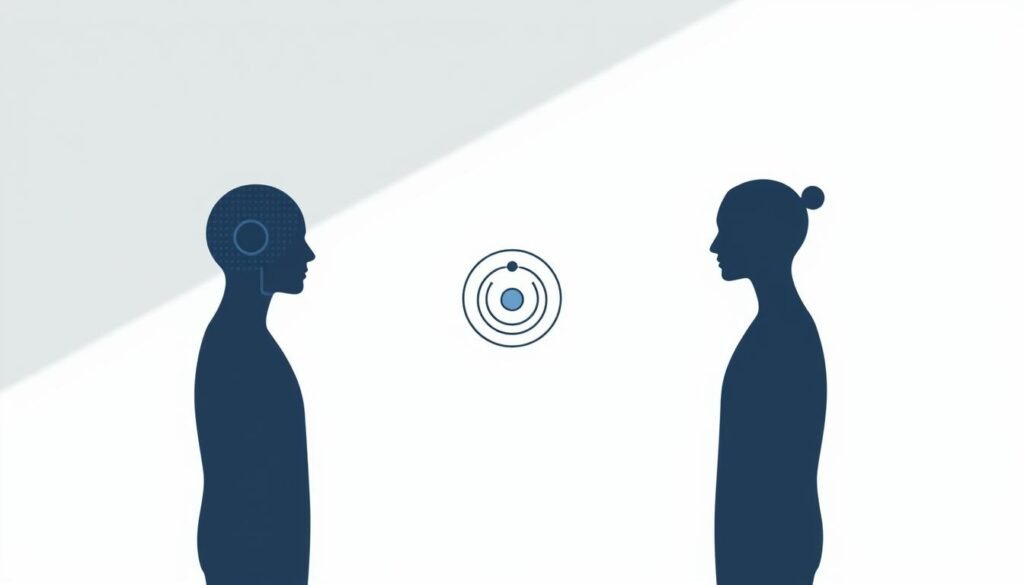Can technology help us achieve better mental wellness? The growth of AI mental health apps and digital therapy platforms hints at yes. As we rely more on these digital solutions, it’s vital to weigh their pros and cons.
The use of AI in psychology is changing mental health care. It could provide tailored support and therapy, which is exciting. Yet, it also brings up big questions about privacy, how well it works, and who can use it.
Key Takeaways
- The role of AI in enhancing mental health support is multifaceted.
- Digital therapy platforms offer new avenues for mental wellness.
- Concerns regarding privacy and efficacy need to be addressed.
- Accessibility to mental health care can be significantly improved.
- The future of mental health support lies in balancing technology with human touch.
Understanding AI in Mental Health Care
Mental health care is changing fast with AI. AI is making a big difference in how we get help for our minds.
AI helps in many ways, like through apps and digital therapy. These tools are designed to help us feel better.
What Are AI Mental Health Apps?
AI mental health apps use artificial intelligence to help us. They offer things like mood tracking, stress management, and cognitive behavioral therapy (CBT). These apps give us support that fits our needs.
Some cool things about AI mental health apps include:
- Personalized therapy plans
- Mood monitoring and analysis
- Guided relaxation techniques
- Cognitive behavioral therapy modules
The Role of Digital Therapy
Digital therapy uses digital platforms for therapy, often with AI. It makes therapy more flexible and easy to get. You can get help from home.
Let’s look at how digital therapy is different from traditional therapy:
| Aspect | Traditional Therapy | Digital Therapy |
|---|---|---|
| Accessibility | Limited by location and availability | Accessible from anywhere with an internet connection |
| Personalization | Dependent on therapist’s expertise and experience | Utilizes AI for tailored support and interventions |
| Cost | Can be expensive, especially for frequent sessions | Often more cost-effective, with flexible pricing models |
It’s important to understand these new technologies. AI is going to change mental health care a lot. It will play a big role in the future of helping our minds.
The Benefits of AI in Psychology
AI is making mental health services more accessible and effective. It uses online therapy tools and cognitive behavioral therapy apps. Now, people can get help from anywhere, anytime.
AI helps reach more people. AI-driven mental wellness platforms help those in remote or underserved areas. These areas often lack traditional mental health services.
Increased Accessibility to Mental Health Resources
AI apps make mental health resources available to more people. This is great for those in areas with few mental health professionals.
These platforms also offer privacy. This can help people who are shy or worried about being judged.
Personalized Care Through Data Analytics
AI can analyze lots of data to give personalized care. It finds the best therapy for each person based on their data.
This makes therapy more effective and engaging. It gives users support that’s right for them at the right time.
Data analytics also help improve these platforms. They can change their approach based on what users say and how they do. This keeps the services up to date with user needs.
Risks and Limitations of AI Mental Health Solutions
AI mental health apps have many benefits but also face big risks. These risks are important to know when using these apps.
One big worry is about keeping personal info safe. These apps collect a lot of data. If not kept secure, this data could be stolen.
Concerns Over Privacy and Data Security
AI mental health apps collect and store a lot of personal data. This raises big privacy and data security risks. Users share sensitive info, which could be very harmful if it gets out.
The danger isn’t just data theft. It’s also about how the data is used. There’s a thin line between helping mental health and using data for other bad reasons.
Potential for Misdiagnosis and Misinformation
AI mental health apps can also lead to misdiagnosis. Even the best AI can make mistakes. This can lead to wrong diagnoses or advice.
There’s also a chance of spreading misinformation. If the data used to train AI is wrong or not updated, it can give out bad info. This can lead to poor mental health choices.
| Risk Category | Description | Potential Impact |
|---|---|---|
| Privacy and Data Security | Unauthorized access to user data | Identity theft, privacy breaches |
| Misdiagnosis | Incorrect interpretation of user data by AI | Inappropriate treatment, worsening of mental health |
| Misinformation | Outdated or incorrect information provided to users | Poor mental health decisions, lack of trust in AI solutions |
It’s key to know these risks to use AI mental health apps right. We need a careful approach that looks at both the good and bad sides of AI in mental health.
Comparing AI Therapy to Traditional Therapy
The rise of AI therapy has sparked a key comparison with traditional therapy. It highlights their strengths and weaknesses. Understanding these differences is crucial for both practitioners and those seeking help.
Efficiency and Cost-Effectiveness
AI therapy has several advantages over traditional therapy. It’s more efficient and cost-effective. Digital therapy platforms can serve more users at once, cutting down wait times. This makes mental health support more accessible.
AI therapy can be accessed anywhere, anytime. This flexibility is a big plus for those with busy lives or living far from mental health services.

Human Empathy vs. Algorithmic Responses
AI therapy’s main drawback is its lack of human empathy. Traditional therapy relies on the bond between therapist and client, which is key for success. An expert says, “AI systems can’t match the depth of human connection.”
“The human element in therapy is irreplaceable. While AI can offer support and guidance, it lacks the emotional understanding and empathy that a human therapist provides.”
The challenge for AI therapy is balancing its efficiency with the need for empathy. Future AI developments might aim to improve emotional intelligence. This could help AI systems respond more like humans.
Case Studies of Successful AI Mental Health Apps
Many AI mental health apps have shown great promise. They use new tech to help people with their mental health. These apps offer unique ways to get support.
Woebot: A Conversational AI Therapist
Woebot is a standout example of AI therapy. It uses principles of Cognitive Behavioral Therapy (CBT) to talk to users. This makes getting help feel more friendly and easy.
A study found that Woebot helps reduce depression and anxiety. This shows AI can be a big help in mental health care.
“The use of AI in mental health apps like Woebot represents a significant step forward in making mental health support more accessible and personalized.”
Wysa: Combining AI with Human Support
Wysa is known for mixing AI with human help. This mix of tech and empathy offers a full support system.
Wysa’s strength is in its personalized support from AI and human help when needed. This has been seen as a way to connect tech with human touch in mental health.
Woebot and Wysa show how AI apps can improve mental health care. They make support accessible, personalized, and effective through AI.
The Future of AI in Mental Health
Digital therapy is changing how we support mental health. Technology keeps getting better, making AI in mental health care more advanced.
Emerging Trends in Digital Therapy
Digital therapy is getting a big boost from AI. Virtual reality (VR) is being used in therapy. It lets people face their fears in a safe space.
Also, chatbots and conversational AI are getting smarter. They offer personalized help and advice, making it easier to manage mental health.
How AI Can Change Therapeutic Practices
AI could change therapy by making it more personalized and data-driven. It analyzes lots of data to help find better treatment plans.
AI can also make therapy more effective. It gives therapists real-time advice, making sessions more engaging and helpful.
The future of AI in mental health includes combining it with other tech. This could lead to even better therapy tools and methods.
Ethical Considerations in AI Mental Health
AI mental health apps are becoming more common. It’s important to make sure they are ethical for user well-being. As these apps grow, we must think about the ethics of their use.
Informed Consent and User Autonomy
Ensuring informed consent is a big issue. Users need to know how their data is used and protected. Since these apps handle personal info, being open about data use is key.
It’s also important to respect user autonomy. Users should control their data and the AI’s decisions about their mental health. They should be able to choose what data is collected and correct any mistakes.
The Divide Between Ethics and Technology
AI tech is advancing fast, but ethics are lagging behind. This divide between ethics and technology is a big problem for AI mental health app developers. Keeping ethics up with tech is essential for responsible innovation.
To solve this, ethicists, tech experts, and healthcare pros need to work together. They can create AI mental health solutions that work well and are ethical.
| Ethical Consideration | Description | Importance |
|---|---|---|
| Informed Consent | Users are fully aware of data usage and protection | High |
| User Autonomy | Users have control over their data and AI decisions | High |
| Ethics-Technology Divide | Balancing technological advancement with ethical frameworks | High |
By focusing on these ethical points, developers can make AI mental health apps that help and respect users.
The Role of Healthcare Professionals in AI Therapy
Healthcare professionals are key in shaping AI therapy’s future. They make sure it’s safe and works well. Their knowledge is vital for checking if AI mental health tools really help.
Collaboration Between Psychologists and Developers
Collaboration between psychologists and developers is needed for AI therapy tools. This team effort makes sure AI solutions are based on solid evidence. It also ensures they meet patient needs.
Psychologists bring their knowledge of therapy and patient needs. Developers use their AI tech skills. Together, they create AI therapy tools that are both new and useful.

Educating Clients About AI Mental Health Tools
Healthcare professionals also teach clients about AI mental health tools. They explain the good and bad of AI therapy. They show how to use these tools right.
This education is key. It helps patients know how AI therapy fits with traditional therapy. It also helps manage what patients expect and keeps them positive about AI in mental health.
In short, healthcare professionals have a big role in AI therapy. They work with developers and teach patients. Their work is crucial for making AI therapy a success in mental health care.
User Experience and Feedback
AI is becoming more important in mental health care. It’s key to understand how users feel about these apps. The success of AI mental health apps depends on user interaction and feedback.
Gathering Insights from Users of AI Apps
Getting insights from users is vital for improving AI mental health apps. Developers need to know how users use the app, what they like, and what’s hard for them. This helps make the app better for everyone.
User feedback comes from surveys, reviews, and data analysis. It shows what needs to be fixed and guides future updates.
The Importance of Iterative Design
Iterative design means making small changes based on user feedback. For AI mental health apps, it means always making the app better for users. This way, the app stays useful and effective.
A study found that iterative design makes AI systems better. It leads to more helpful and easy-to-use mental health tools.
“The iterative design process is crucial for developing AI mental health apps that are both effective and engaging for users.”
Iterative design is key because it keeps the app relevant and useful. It makes users happier and helps the app succeed in the long run.
- Enhances user satisfaction through continuous improvement
- Improves the effectiveness of AI mental health interventions
- Supports the long-term success of AI mental health apps
Current Regulations Impacting AI Mental Health Apps
The world of AI in mental health is changing fast. We need to look closely at the rules that guide it. Knowing these rules is key for developers, healthcare workers, and users of AI mental health apps.
Overview of Legal Frameworks
There are many rules for AI mental health apps. These rules cover data privacy, security, and health services. In the U.S., the Health Insurance Portability and Accountability Act (HIPAA) is important. It helps decide how AI apps handle your data.
Key Regulations:
- HIPAA: Protects sensitive patient health information.
- GDPR: Although a European regulation, it impacts global apps handling EU user data.
- FTC Guidelines: The Federal Trade Commission provides guidelines on data security and privacy.
The Impact of Regulations on Innovation
Rules are important for keeping users safe and ensuring AI apps work well. But, following these rules can be hard and expensive. This might slow down the creation and use of new AI mental health tools.
| Regulation | Focus | Impact on AI Mental Health Apps |
|---|---|---|
| HIPAA | Data Privacy and Security | Requires secure handling of user health information. |
| GDPR | Data Protection and Privacy | Impacts global apps with EU user data, requiring stringent data protection measures. |
| FTC Guidelines | Data Security and Privacy Practices | Guides best practices for data handling and security. |
“The regulatory environment for AI in mental health is rapidly evolving. Companies must stay ahead of these changes to ensure compliance and maintain user trust.”
Understanding current rules and their effects is crucial. Developers and healthcare workers need to follow these rules. They also need to be ready for future changes that might affect AI mental health apps.
Conclusion: Balancing Technology and Human Touch
The use of AI in mental health care has brought new ways to support and treat people. It’s important to find a balance between new tech and the human connection needed in mental health.
Advancements in Mental Health Care
AI in psychology has shown great promise. It offers digital therapy and mental health apps that make help more accessible. As we look to the future, we expect even more improvements in mental health care.
Ensuring Effective and Ethical Solutions
To make sure AI mental health solutions work well and are fair, we need ongoing research. We must tackle privacy and data security issues and avoid misdiagnosis. This way, AI can truly help improve lives around the world.



